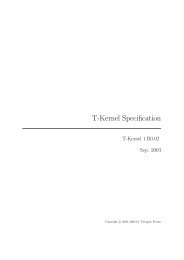[8] 2002 e-business-strategies-for-virtual-organizations
[8] 2002 e-business-strategies-for-virtual-organizations
[8] 2002 e-business-strategies-for-virtual-organizations
Create successful ePaper yourself
Turn your PDF publications into a flip-book with our unique Google optimized e-Paper software.
e-Business Strategies <strong>for</strong> Virtual Organizations<br />
that is itself strategic and subject to constant re-evaluation. The<br />
choice of exploitation, exploration or innovation reflects the<br />
overall competitive <strong>business</strong> strategy of the organization.<br />
Strategic positioning within this framework reflects the knowledge<br />
management strategy in alignment with the <strong>business</strong><br />
strategy. These two together can radically change the organization<br />
and the way it is positioned within the marketplace.<br />
7.6.2 Strategic Levers<br />
The successful <strong>virtual</strong> organization will be the one that works out<br />
a series of procedures <strong>for</strong> getting or capturing the most value<br />
from its strategic inter-organizational alliances. In this way, it<br />
moves beyond the boundaries of its own organizational <strong>for</strong>m as a<br />
source and container of knowledge and moves towards the<br />
model of unbounded innovators. This aggressive strategy has<br />
been shown to outper<strong>for</strong>m more conservative ones in knowledge<br />
intensive industries. In any one organization, however, it is<br />
likely that value will be leveraged by concentrating on just a few<br />
of the strategic levers <strong>for</strong> knowledge management such as:<br />
� Customer knowledge – the most vital in most <strong>organizations</strong>.<br />
� Knowledge in processes – applying the best know-how while<br />
per<strong>for</strong>ming core tasks.<br />
� Knowledge in products (and services) – smarter solutions,<br />
customized to users’ needs.<br />
� Knowledge in people – nurturing and harnessing brainpower,<br />
the most precious asset.<br />
� Organizational memory – drawing on lessons from the past or<br />
elsewhere in the organization.<br />
� Knowledge in relationships – deep personal knowledge that<br />
underpins successful collaboration.<br />
� Knowledge assets – measuring and managing intellectual<br />
capital.<br />
7.7 Creating knowledge <strong>strategies</strong><br />
154<br />
There are ten vital issues that must be considered if an<br />
organization wants to use the potential of the new dynamics of<br />
<strong>virtual</strong> markets:<br />
1 Strategy – pursue <strong>strategies</strong> of change, not merely seeking to<br />
defend an established position:<br />
� Learn to think ‘outside the box’ by questioning constraining<br />
assumptions


![[8] 2002 e-business-strategies-for-virtual-organizations](https://img.yumpu.com/8167654/173/500x640/8-2002-e-business-strategies-for-virtual-organizations.jpg)












